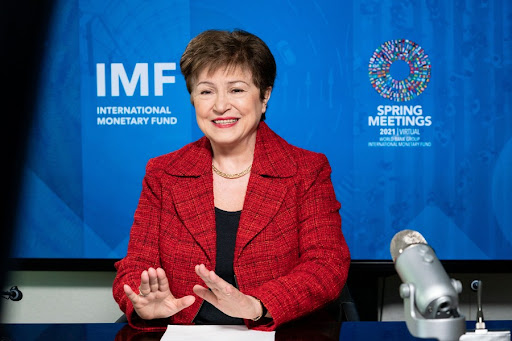IMF’s Kristalina Georgieva looking forward ‘very much’ to Egypt hosting COP27
The International Monetary Fund’s (IMF) managing director Kristalina Georgieva said on Friday she is looking forward “very much” to Egypt hosting the 2022 United Nations Climate Change Conference (COP27) next month.
“Since we last gathered in person, the world has seen extraordinary upheaval. Pandemic, war, and record-high inflation driving a cost-of-living crisis.” Georgieva told a news conference on the sidelines of the IMF-World Bank Annual Meetings in Washington D.C.
“For policymakers, the pandemic meant taking extraordinary action to shield households and firms from the worst effects. This was vital, but in the process additional spending reached 10 percent of GDP globally in the first 18 months of the pandemic.”
As crisis has followed crisis, Georgieva said many countries faced sharply reduced buffers and increased external pressures.
“The IMF stepped up to help—in fact, with an unprecedented response: $260 billion in new financing to 93 economies delivered at record speed just since COVID-19 hit. Since Russia’s invasion of Ukraine, we have supported 16 countries with close to $90 billion– and a further 28 countries have expressed interest in receiving Fund support. This is on top of last year’s historic $650 billion SDR allocation.”
Even as countries tackled immediate and pressing challenges, vulnerabilities were building, the IMF official added.
“Supply-demand imbalances, pandemic-era policy support, and Russia’s invasion of Ukraine led to severe inflationary pressures. Sovereign debts reached record highs in 2020 and are projected at 91 percent of GDP globally this year, while accommodative monetary policy pushed up prices for riskier assets.”
“What we are experiencing is a fundamental shift—from a period of relative stability, low rates, and low inflation to a period of high rates, high inflation, and much greater uncertainty. And this comes as climate disasters become far more frequent and more extreme, and geopolitical tensions make global cooperation far harder.”
“We are entering a new danger zone—a world that is more fragmented, more fragile, and more prone to shocks that can quickly knock countries off course—often through no fault of their own.
“After navigating extraordinary challenges over the past two-and-a-half years, further extraordinary challenges lie before us. Indeed, the path ahead is likely to be just as tough, if not tougher.”
Turning to the present, Georgieva said the IMF’s projection for global growth next year is 2.7 percent, the fourth downgrade in 12 months, and there is a 1 in 4 chance it could fall below 2 percent.
“Markets have been extremely volatile, and the risk of a recession is rising in many economies.”
The biggest immediate challenge is to bring down inflation, she added.
“We see central banks rapidly tightening policy, laser-focused on restoring price stability. This is the right thing to do, but it will come at a painful cost: growth will be slower and unemployment higher as monetary tightening ratchets up.”
“Formulating the appropriate fiscal policy is key. The priority must be to protect vulnerable households—with targeted measures to alleviate the impact of rising food and fuel prices.
At the same time fiscal policy must work with, not against, monetary policy. To avoid stoking inflation, any new spending must be offset by savings or new revenue.”
“The need to rebuild buffers and reduce debt makes this doubly important. The pandemic gave us a vivid illustration of why fiscal space matters and how crucial it is to address pre-existing vulnerabilities.”
As policymakers determine the right balance of monetary and fiscal measures, they must also keep a watchful eye on stresses in the financial sector, the IMF official stated.
“Here, macroprudential policy must guard against the failure of systemic institutions, using selected instruments to address pockets of elevated vulnerability among nonbank financial institutions and credit markets.”
Policymakers have an incredibly narrow path to walk—there is no room for missteps. Get it wrong and the challenges of the present could mutate into worse problems – prolonged low growth, entrenched inflation, or even sovereign debt crises with the risk of contagion.
“On the other hand, a well-calibrated policy package would—over time—lead to more durable growth, more stable prices, and healthier public finances. More than that—we would see more resilient economies emerge, better prepared to cope with shocks.”


